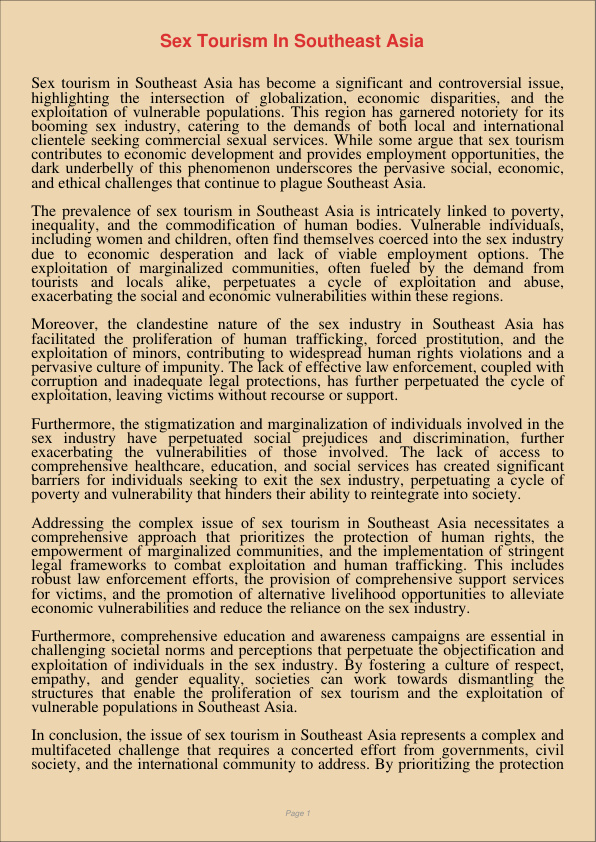Sex Tourism In Southeast Asia
Jan 9, 2024
southeast asia
sex tourism
Biology
Macro & Microeconomics

Sex tourism in Southeast Asia has become a significant and controversial issue, highlighting the intersection of globalization, economic disparities, and the exploitation of vulnerable populations. This region has garnered notoriety for its booming sex industry, catering to the demands of both local and international clientele seeking commercial sexual services. While some argue that sex tourism contributes to economic development and provides employment opportunities, the dark underbelly of this phenomenon underscores the pervasive social, economic, and ethical challenges that continue to plague Southeast Asia.
The prevalence of sex tourism in Southeast Asia is intricately linked to poverty, inequality, and the commodification of human bodies. Vulnerable individuals, including women and children, often find themselves coerced into the sex industry due to economic desperation and lack of viable employment options. The exploitation of marginalized communities, often fueled by the demand from tourists and locals alike, perpetuates a cycle of exploitation and abuse, exacerbating the social and economic vulnerabilities within these regions.
Moreover, the clandestine nature of the sex industry in Southeast Asia has facilitated the proliferation of human trafficking, forced prostitution, and the exploitation of minors, contributing to widespread human rights violations and a pervasive culture of impunity. The lack of effective law enforcement, coupled with corruption and inadequate legal protections, has further perpetuated the cycle of exploitation, leaving victims without recourse or support.
Furthermore, the stigmatization and marginalization of individuals involved in the sex industry have perpetuated social prejudices and discrimination, further exacerbating the vulnerabilities of those involved. The lack of access to comprehensive healthcare, education, and social services has created significant barriers for individuals seeking to exit the sex industry, perpetuating a cycle of poverty and vulnerability that hinders their ability to reintegrate into society.
Addressing the complex issue of sex tourism in Southeast Asia necessitates a comprehensive approach that prioritizes the protection of human rights, the empowerment of marginalized communities, and the implementation of stringent legal frameworks to combat exploitation and human trafficking. This includes robust law enforcement efforts, the provision of comprehensive support services for victims, and the promotion of alternative livelihood opportunities to alleviate economic vulnerabilities and reduce the reliance on the sex industry.
Furthermore, comprehensive education and awareness campaigns are essential in challenging societal norms and perceptions that perpetuate the objectification and exploitation of individuals in the sex industry. By fostering a culture of respect, empathy, and gender equality, societies can work towards dismantling the structures that enable the proliferation of sex tourism and the exploitation of vulnerable populations in Southeast Asia.
In conclusion, the issue of sex tourism in Southeast Asia represents a complex and multifaceted challenge that requires a concerted effort from governments, civil society, and the international community to address. By prioritizing the protection of human rights, promoting social and economic empowerment, and implementing stringent legal frameworks, societies can work towards eradicating the pervasive exploitation and abuse that continue to plague the region. Through collaborative and holistic interventions, Southeast Asia can strive towards a future where the dignity and rights of all individuals are upheld and respected.